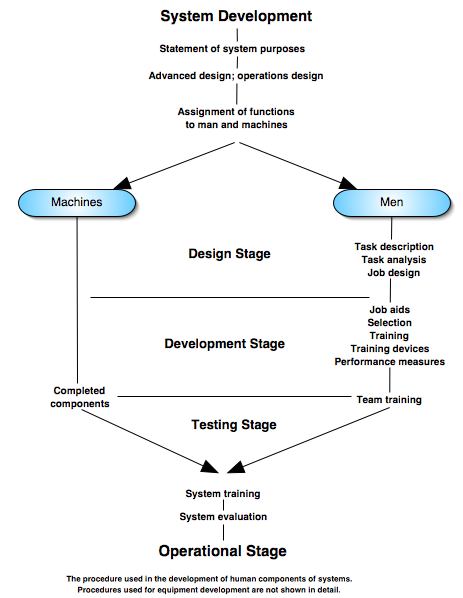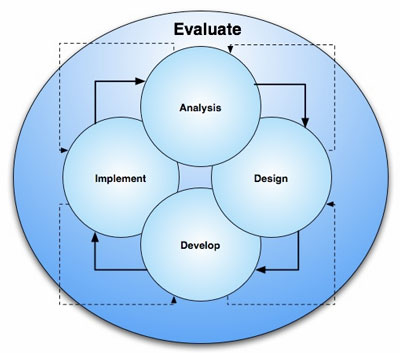Psychological Principles in System Development - 1962
Robert Gagnè edited the ground breaking Psychological Principles in System Development that integrates psychotechnology (application of technology for psychological purposes) in systems development.
In the book, Gagnè discusses the formalization of the systems concept in the post WWII era and into the early 1950's. The main theme of system design was to integrate people and machines into an operational system (by machines he means technology). While engineers generally concentrated on machines, this collection of works focuses on people and their interactions with machines, devices, and technology.
System design begins with a state of purpose. The chart below shows Gagnè's procedures used in system development:

After the Planning stage, the Design stage occurs. While the chart does not show an Analysis stage, he includes task analysis as one of the steps in the Design stage.
Once you have determined what kind of performance is required, you move into the Development phase to create the tools required to master the tasks, such as job aids, training, and training devices.
Next, you bring together the products of this effort and put it into operation (Implementation) by conducting Team Training. During this stage you evaluate the system to ensure it is working properly. (Testing Stage)
Robert Glaser also became deeply involved in helping the military with instructional systems in the 1950s and 1960s. And since both him and Gagnè had deep influences in our training and educational systems, system concepts naturally began to weave their way into both fields.
SHOCKACTION
One of the interesting system development projects discussed in Gagnè's book is building a revised course of instruction for armor crewman training at Fort Knox, Kentucky. The project was code named SHOCKACTION and undertaken during the late 1950s. The course trained tank crewmen to act as a tank commander, driver, gunner, or loader of the Army's main battle tank. The course was considered important and worthy of considerable investment of research and development funds as it the present course was not training armor crewmen to the required level of proficiency.
The SHOCKACTION training revamp is discussed in two chapters (Concepts of Training by Meredith Crawford and The System Concept and Methodological Decision by John Finan) and is quite interesting as the newly developed course was not only superior to the old course, but also shorter as they were able to reduce the training from eight weeks to six weeks.
Next Steps
Next Section: Robert Glaser - Instructional System - 1962
Return to the History of Instructional System Design
Reference
Gagnè, R.M. (1962). Psychological Principles in System Development. New York: Holt, Rinehart and Winston, Inc.

